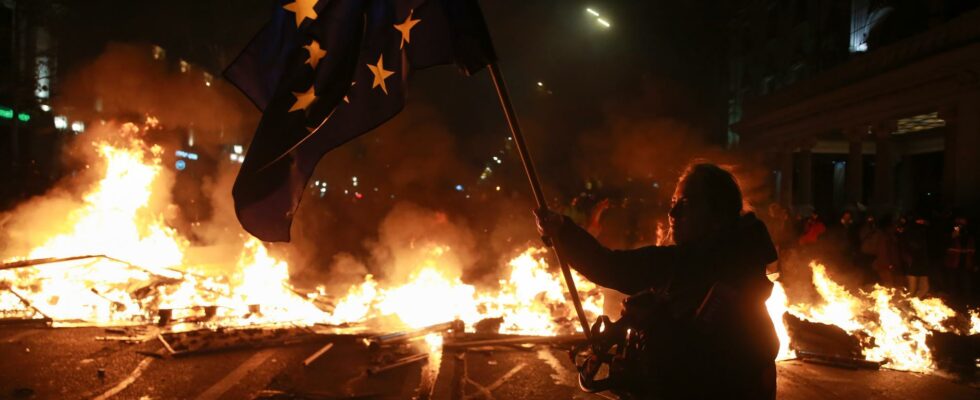unsaveSave
A protester with an EU flag in front of a burning barricade in the Georgian capital Tbilisi on Tuesday night.
1 / 3 Photo: Zurab Tsertsvadze/AP/TT
Georgia is rocked by widespread demonstrations after the government’s announcement to freeze all talks about EU membership.
The next few days are predicted to be decisive for the future of the Caucasian country. Georgia expert Jakob Hedenskog sees several possible scenarios – and does not rule out violent Russian intervention.
The demonstrations of the last few days in Georgia are the largest in many years, notes Jakob Hedenskog, analyst at the Center for East European Studies at the Foreign Policy Institute (UI).
He draws parallels with the Maidan in Ukraine in 2014, when a widespread popular uprising led to the fall of pro-Russian President Viktor Yanukovych.
– Others want to downplay that analogy, because what was the consequence of the Euromaidan revolution was also Russia’s annexation of Crimea and the incursion into eastern Ukraine. So it’s not just a positive parallel.
Crack in the government
The coming days are judged to be decisive for Georgia. Jakob Hedenskog sees four possible scenarios – the most violent is that the government cracks down so brutally on the protesters that they give up.
Another is a compromise between the government and the protesters, but in the deeply polarized Georgia, that is unlikely, according to Hedenskog.
The third scenario is that the protest wave grows so strong that it leads to a growing political rift and then that the government collapses. At the weekend, pro-Western President Salomé Zourabichvili, who is mainly in ceremonial power, announced that she does not intend to step down when her term expires later in December.
Russian intervention?
Several ambassadors and other officials have resigned in protest in recent days.
– You can imagine that the tendency towards rifts that we see within the elite is growing – and that the regime is thus being seriously challenged, says Jakob Hedenskog.
The fourth scenario is possibly the most worrying. The ruling Georgian Dream party has been accused in recent years of increasingly acting as puppets for Russia, and the regime in Moscow is believed to be keen to keep its friends in power in Tbilisi.
– Some form of foreign intervention is not unthinkable – that is, that Russia would intervene, says Hedenskog.
– I find it difficult to see that Russia would watch silently when a regime that has become as adaptable to Russia as the one in Georgia is overthrown.
FACTSGeorgia and Russia
The ruling Georgian Dream party, founded by billionaire Bidzina Ivanishvili who made his fortune in Russia, has in recent years come up with a series of legislative changes and proposals that bring to mind Russian power exercises.
In June, a heavily contested so-called agent law came into force. The law, which is very similar to one previously introduced in Russia, means that organizations that receive money from abroad are considered to be acting in the “interests of a foreign power”. The law placed major obstacles on the well-trodden path towards membership in the EU and triggered major popular protests in several rounds.
In August, the government announced that it will ensure that the main opposition party, the United National Movement, is banned.
At the same time, Georgian Dream also announced plans for a law against “pseudoliberal ideologies” and to severely limit the rights of LGBTQ people.
Georgia was incorporated into Russia in 1801 but became independent again after the collapse of the Soviet Union in 1991. However, after a short war in 2008, Russia effectively controls two parts of Georgia in the form of the breakaway regions of Abkhazia and South Ossetia.
The ruling party says it wants to restore the country’s territorial integrity in a peaceful way so that it is “consistent with a new reality”. It is not clear how this will happen, but the party and its founder Bidzina Ivanishvili have been lobbying for a “pragmatic” relationship with the big neighbor to the north for some time now.
Read more
